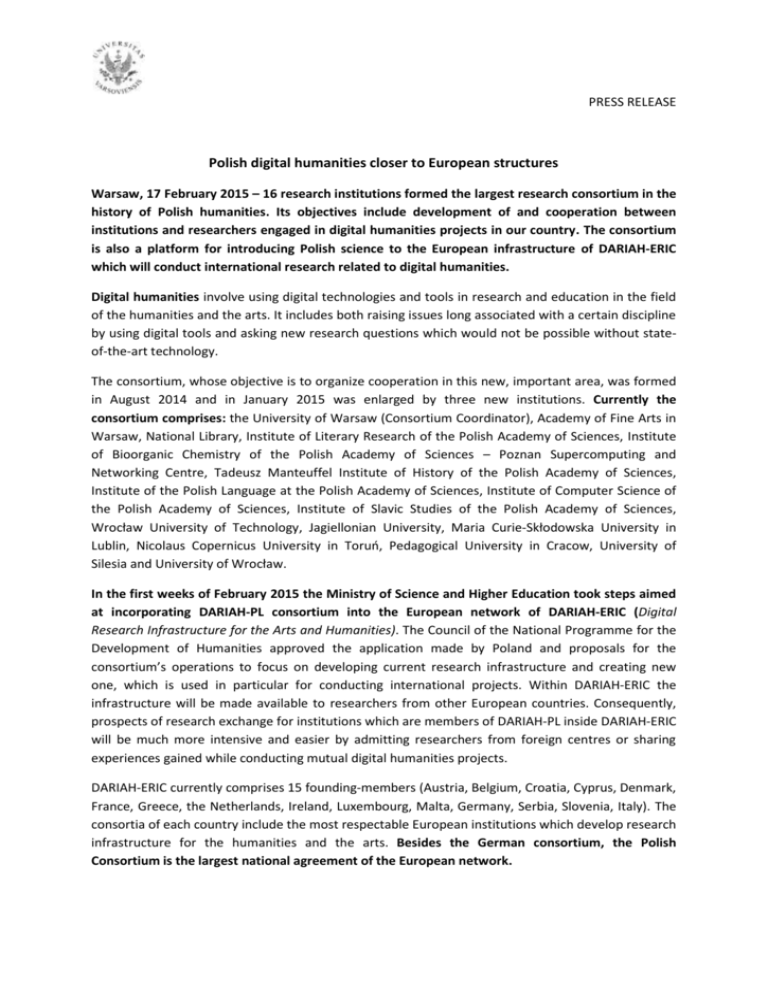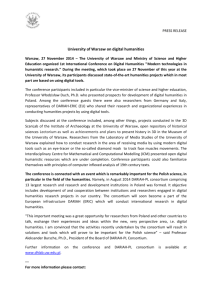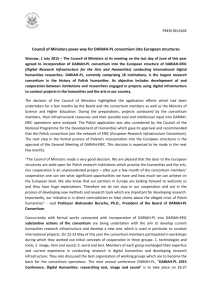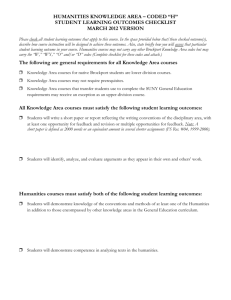PRESS RELEASE Polish digital humanities closer to European
advertisement

PRESS RELEASE Polish digital humanities closer to European structures Warsaw, 17 February 2015 – 16 research institutions formed the largest research consortium in the history of Polish humanities. Its objectives include development of and cooperation between institutions and researchers engaged in digital humanities projects in our country. The consortium is also a platform for introducing Polish science to the European infrastructure of DARIAH-ERIC which will conduct international research related to digital humanities. Digital humanities involve using digital technologies and tools in research and education in the field of the humanities and the arts. It includes both raising issues long associated with a certain discipline by using digital tools and asking new research questions which would not be possible without stateof-the-art technology. The consortium, whose objective is to organize cooperation in this new, important area, was formed in August 2014 and in January 2015 was enlarged by three new institutions. Currently the consortium comprises: the University of Warsaw (Consortium Coordinator), Academy of Fine Arts in Warsaw, National Library, Institute of Literary Research of the Polish Academy of Sciences, Institute of Bioorganic Chemistry of the Polish Academy of Sciences – Poznan Supercomputing and Networking Centre, Tadeusz Manteuffel Institute of History of the Polish Academy of Sciences, Institute of the Polish Language at the Polish Academy of Sciences, Institute of Computer Science of the Polish Academy of Sciences, Institute of Slavic Studies of the Polish Academy of Sciences, Wrocław University of Technology, Jagiellonian University, Maria Curie-Skłodowska University in Lublin, Nicolaus Copernicus University in Toruń, Pedagogical University in Cracow, University of Silesia and University of Wrocław. In the first weeks of February 2015 the Ministry of Science and Higher Education took steps aimed at incorporating DARIAH-PL consortium into the European network of DARIAH-ERIC (Digital Research Infrastructure for the Arts and Humanities). The Council of the National Programme for the Development of Humanities approved the application made by Poland and proposals for the consortium’s operations to focus on developing current research infrastructure and creating new one, which is used in particular for conducting international projects. Within DARIAH-ERIC the infrastructure will be made available to researchers from other European countries. Consequently, prospects of research exchange for institutions which are members of DARIAH-PL inside DARIAH-ERIC will be much more intensive and easier by admitting researchers from foreign centres or sharing experiences gained while conducting mutual digital humanities projects. DARIAH-ERIC currently comprises 15 founding-members (Austria, Belgium, Croatia, Cyprus, Denmark, France, Greece, the Netherlands, Ireland, Luxembourg, Malta, Germany, Serbia, Slovenia, Italy). The consortia of each country include the most respectable European institutions which develop research infrastructure for the humanities and the arts. Besides the German consortium, the Polish Consortium is the largest national agreement of the European network. "Cooperation between so many important Polish humanities institutions creates a platform for talks, exchanging experiences and ideas within new and very perspective area, namely digital humanities. I am convinced that the activities recently undertaken by the consortium will result in solutions and tools which will prove to be important for the Polish science” - said Professor Aleksander Bursche, Ph.D., President of the Board of DARIAH-PL Consortium when addressing the consortium’s enlargement. Further information on DARIAH-PL is available at www.dhlab.uw.edu.pl. --For more information please contact: Karolina Brylska, Ph.D. Journalism Institute of the University of Warsaw mail: karolina.brylska@id.uw.edu.pl tel. 508 388 334







